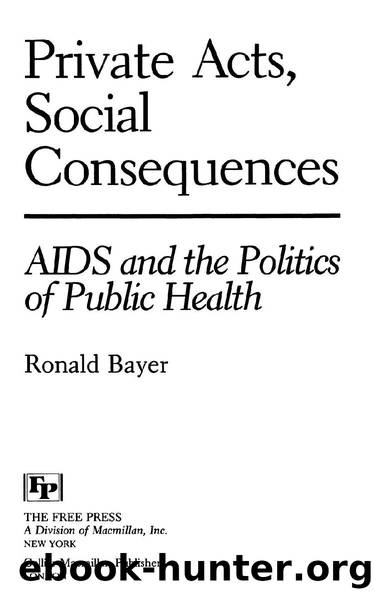Private Acts, Social Consequences by Ronald Bayer

Author:Ronald Bayer
Language: eng
Format: epub
Publisher: The Free Press
Published: 1989-07-15T00:00:00+00:00
Chapter 5
Compulsory Screening
The Politics of Exclusion
Historically, public health officials have sought to identify those who carried infectious diseases as a way of controlling the spread of dangerous pathogens. Identification has served as the prelude to compulsory treatment, as the prelude to exclusion from settings in which infection might be transmitted, as the prelude to isolation and quarantine. Thus the history of mass testing and screening for disease has been linked to a range of public health measures entailing the exercise of coercive authority.
In the context of the AIDS epidemic, where no effective therapy was available during the epidemic’s first seven years, proposals for wide-scale voluntary testing and counseling, contact notification, and even public health reporting have been based on the assumption that the identification of individuals infected with the AIDS virus was essential to any social program whose goal was the broad-based modification of behaviors linked to the spread or acquisition of HIV infection. Proposals for mandatory screening have typically sought to serve a very different purpose. There have, on occasion, been proposals to screen all high-risk individuals as they passed through a variety of medical and social institutions, thereby compelling the asymptomatic to know their antibody status. More generally, proposals for mandatory testing have been made in order to permit the identification of the infected so that restrictions and exclusions might be imposed on them.
In a few circumscribed settings mandatory testing for the antibody to the AIDS virus has been adopted without protest because of the virtually universal recognition that an important public health good, not otherwise attainable, would be secured. Screening of blood, organ, and semen donors has provoked little outcry—after the initial uncertainties of 1985 in blood banking—because all parties understood that the exclusion of contaminated body fluids and tissue from the donor pool was essential for the protection of others. In virtually all other settings proposals for mandatory screening have provoked controversy, not only because of the invasion of privacy and application of coercion involved, but because of the restrictive and exclusionary purposes they have been designed to serve. The proponents of mandatory screening have asserted that even the theoretical possibility of transmission warrants the identification and special treatment of the infected. Such moves were opposed by those who characterized them as a response to irrational fears, as scientifically unwarranted discrimination and nothing more than the application of the patina of public health to the invasion of privacy—in short, thinly disguised efforts to identify and then exclude homosexual or bisexual men or those with a history of intravenous drug abuse.
Download
This site does not store any files on its server. We only index and link to content provided by other sites. Please contact the content providers to delete copyright contents if any and email us, we'll remove relevant links or contents immediately.
Men In Love by Nancy Friday(5223)
Everything Happens for a Reason by Kate Bowler(4725)
The Immortal Life of Henrietta Lacks by Rebecca Skloot(4569)
Why We Sleep by Matthew Walker(4421)
The Sports Rules Book by Human Kinetics(4372)
Not a Diet Book by James Smith(3401)
The Emperor of All Maladies: A Biography of Cancer by Siddhartha Mukherjee(3135)
Sapiens and Homo Deus by Yuval Noah Harari(3054)
Day by Elie Wiesel(2774)
Angels in America by Tony Kushner(2640)
A Burst of Light by Audre Lorde(2586)
Endless Forms Most Beautiful by Sean B. Carroll(2466)
Hashimoto's Protocol by Izabella Wentz PharmD(2361)
Dirty Genes by Ben Lynch(2307)
Reservoir 13 by Jon McGregor(2286)
Wonder by R J Palacio(2197)
And the Band Played On by Randy Shilts(2181)
The Immune System Recovery Plan by Susan Blum(2051)
Stretching to Stay Young by Jessica Matthews(2022)
